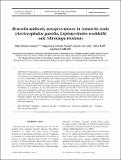Files in this item
Brucella antibody seroprevalence in Antarctic seals (Arctocephalus gazella, Leptonychotes weddellii and Mirounga leonina)
Item metadata
| dc.contributor.author | Jensen, Silje-Kristin | |
| dc.contributor.author | Nymo, Ingebjorg Helena | |
| dc.contributor.author | Forcada, Jaume | |
| dc.contributor.author | Hall, Ailsa | |
| dc.contributor.author | Godfroid, Jacques | |
| dc.date.accessioned | 2018-09-02T23:34:51Z | |
| dc.date.available | 2018-09-02T23:34:51Z | |
| dc.date.issued | 2013-09-03 | |
| dc.identifier | 103828126 | |
| dc.identifier | e9cbc434-c05f-40bd-a922-c16b39854183 | |
| dc.identifier | 000323911300001 | |
| dc.identifier | 84883682928 | |
| dc.identifier.citation | Jensen , S-K , Nymo , I H , Forcada , J , Hall , A & Godfroid , J 2013 , ' Brucella antibody seroprevalence in Antarctic seals ( Arctocephalus gazella, Leptonychotes weddellii and Mirounga leonina ) ' , Diseases of Aquatic Organisms , vol. 105 , no. 3 , pp. 175-181 . https://doi.org/10.3354/dao02633 | en |
| dc.identifier.issn | 0177-5103 | |
| dc.identifier.other | ORCID: /0000-0002-7562-1771/work/47136298 | |
| dc.identifier.uri | https://hdl.handle.net/10023/15942 | |
| dc.description.abstract | Brucellosis is a worldwide infectious zoonotic disease caused by Gram-negative bacteria of the genus Brucella, and Brucella infections in marine mammals were first reported in 1994. A serosurvey investigating the presence of anti-Brucella antibodies in 3 Antarctic pinniped species was undertaken with a protein A/G indirect enzyme-linked immunosorbent assay (iELISA) and the Rose Bengal test (RBT). Serum samples from 33 Weddell seals Leptonychotes weddelli were analysed, and antibodies were detected in 8 individuals (24.2%) with the iELISA and in 21 (65.6%) with the RBT. We tested 48 southern elephant seal Mirounga leonina sera and detected antibodies in 2 animals (4.7%) with both the iELISA and the RBT. None of the 21 Antarctic fur seals Arctocephalus gazella was found positive. This is the first report of anti-Brucella antibodies in southern elephant seals. The potential impact of Brucella infection in pinnipeds in Antarctica is not known, but Brucella spp. are known to cause abortion in terrestrial species and cetaceans. Our findings suggest that Brucella infection in pinnipeds is present in the Antarctic, but to date B. pinnipedialis has not been isolated from any Antarctic pinniped species, leaving the confirmation of infection pending. | |
| dc.format.extent | 7 | |
| dc.format.extent | 117137 | |
| dc.language.iso | eng | |
| dc.relation.ispartof | Diseases of Aquatic Organisms | en |
| dc.subject | Serology | en |
| dc.subject | Antarctic fur seal | en |
| dc.subject | Weddell seal | en |
| dc.subject | Southern elephant seal | en |
| dc.subject | Pinniped | en |
| dc.subject | Brucella pinnipedialis | en |
| dc.subject | SOUTHERN ELEPHANT SEALS | en |
| dc.subject | MARINE MAMMAL BRUCELLA | en |
| dc.subject | AUSTRALIAN FUR SEALS | en |
| dc.subject | ANTIBRUCELLA ANTIBODIES | en |
| dc.subject | NEW-ZEALAND | en |
| dc.subject | INFECTION | en |
| dc.subject | POPULATION | en |
| dc.subject | PINNIPEDIALIS | en |
| dc.subject | PATHOGENS | en |
| dc.subject | FORSTERI | en |
| dc.subject | QL Zoology | en |
| dc.subject | GC Oceanography | en |
| dc.subject | SDG 14 - Life Below Water | en |
| dc.subject.lcc | QL | en |
| dc.subject.lcc | GC | en |
| dc.title | Brucella antibody seroprevalence in Antarctic seals (Arctocephalus gazella, Leptonychotes weddellii and Mirounga leonina) | en |
| dc.type | Journal article | en |
| dc.contributor.sponsor | NERC | en |
| dc.contributor.institution | University of St Andrews. School of Biology | en |
| dc.contributor.institution | University of St Andrews. Sea Mammal Research Unit | en |
| dc.contributor.institution | University of St Andrews. Marine Alliance for Science & Technology Scotland | en |
| dc.contributor.institution | University of St Andrews. Scottish Oceans Institute | en |
| dc.identifier.doi | https://doi.org/10.3354/dao02633 | |
| dc.description.status | Peer reviewed | en |
| dc.date.embargoedUntil | 2018-09-03 | |
| dc.identifier.grantnumber | Agreement R8-H12-86 | en |
This item appears in the following Collection(s)
Items in the St Andrews Research Repository are protected by copyright, with all rights reserved, unless otherwise indicated.

